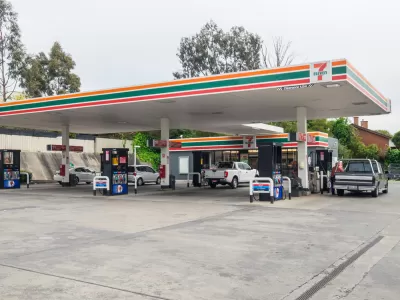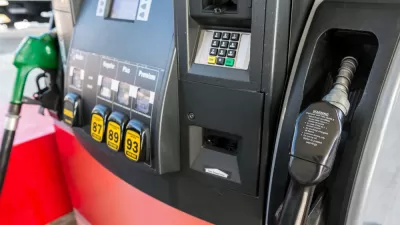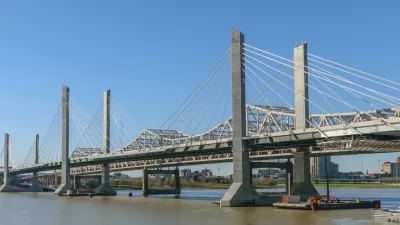Missouri has come up with a unique way to pay for roads, and it's even a user fee, though it bears no direct relation to road users other than for those driving to the store to buy their cigarettes. So much for using the tax to address public health.

Missourinet. "Missouri’s cigarette tax is the lowest in the nation, at 17 cents per pack."
The measure will appear on the November 8 ballot. Voters will choose from two versions according to Ballotpedia:
Version 79 would dedicate the revenue to the state general revenue fund and version 80 would require revenue to be used exclusively for transportation infrastructure projects.
The state gas tax may not be the lowest, but at 17.3 cents per gallon, only Oklahoma, South Carolina, New Jersey and Alaska, in that order, had lower gas taxes as of April 16, according to the American Petroleum Institute [PDF]. The average state gas tax, including fees, is 29.64 cents per gallon per API. Recent efforts to increase it in Missouri are noted below.
Interestingly, the American Cancer Society and other public health advocates are not opposing the measure because of where the revenue will be directed, but because the tax is too small to make a difference to deter smoking by youths, according to a joint statement in opposition to the Missouri 23 Cent Cigarette Tax Initiative (2016) per Ballotpedia:
It is alarming and deceitful for the tobacco industry to support two insufficient tobacco tax proposals in our state under the guise of concern about education and transportation funding. Small increases to the tobacco tax – like the proposals being considered – will generate new revenue, but will not keep kids from becoming addicted to cigarettes or help adults quit.
Last month, the state Senate approved a 5.9 cents per gallon gas tax ballot measure that would have gone to the voters in November, but inexplicably this month, the "House leadership never called the bill for a vote, leaving the state with a continuing transportation funding crisis," wrote Doug Wilson for the Herald-Whig. The legislative session ended May 13.
Missouri's transportation funding crisis was described in January and unsuccessful attempts at increasing transportation funding were chronicled last July:
- May, 2014: Legislature votes to put transportation sales tax measure on ballot after overriding Gov. Jay Nixon's veto of a cut to the state income tax. Reducing the income tax while raising the sales tax may have influenced the election outcome
- August 5, 2014: Voters reject .75 percent transportation sales tax measure by 59 percent.
- April 2015: Legislation proposed to raise gas tax by six cents over three years.
- April 2015: Bill is changed to two cents for one year, then "Senate Majority Leader Ron Richard said that he doesn't want to waste more time on the bill."
There is something both insidious and ingenious in asking less than 20 percent* of the population to pay for the transportation needs for everyone. Revenue should be directed towards campaigns to stop smoking, the leading cause of preventable death in the U.S. and internationally, and toward health care costs caused by tobacco addiction.
*17.5% - 20.4% of population in 2014 in Missouri smoked per Centers for Disease Control and Prevention.
Hat tip to AASHTO Daily Transportation Update
FULL STORY: One Missouri road funding effort dies, another could be on ballot

Alabama: Trump Terminates Settlements for Black Communities Harmed By Raw Sewage
Trump deemed the landmark civil rights agreement “illegal DEI and environmental justice policy.”

Planetizen Federal Action Tracker
A weekly monitor of how Trump’s orders and actions are impacting planners and planning in America.

The 120 Year Old Tiny Home Villages That Sheltered San Francisco’s Earthquake Refugees
More than a century ago, San Francisco mobilized to house thousands of residents displaced by the 1906 earthquake. Could their strategy offer a model for the present?

Indy Neighborhood Group Builds Temporary Multi-Use Path
Community members, aided in part by funding from the city, repurposed a vehicle lane to create a protected bike and pedestrian path for the summer season.

Congestion Pricing Drops Holland Tunnel Delays by 65 Percent
New York City’s contentious tolling program has yielded improved traffic and roughly $100 million in revenue for the MTA.

In Both Crashes and Crime, Public Transportation is Far Safer than Driving
Contrary to popular assumptions, public transportation has far lower crash and crime rates than automobile travel. For safer communities, improve and encourage transit travel.
Urban Design for Planners 1: Software Tools
This six-course series explores essential urban design concepts using open source software and equips planners with the tools they need to participate fully in the urban design process.
Planning for Universal Design
Learn the tools for implementing Universal Design in planning regulations.
Clanton & Associates, Inc.
Jessamine County Fiscal Court
Institute for Housing and Urban Development Studies (IHS)
City of Grandview
Harvard GSD Executive Education
Toledo-Lucas County Plan Commissions
Salt Lake City
NYU Wagner Graduate School of Public Service




























